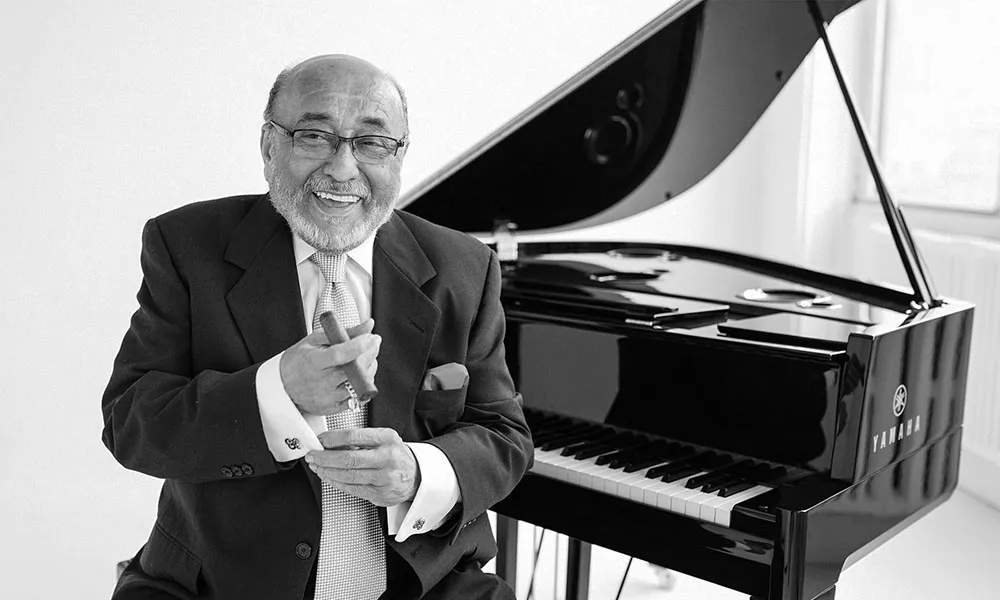On August 6, 2025, the world lost one of its greatest musical visionaries. Eddie Palmieri, the legendary pianist, bandleader, and composer whose artistry transformed Latin music, passed away in Hackensack, New Jersey, at the age of 88. Known as the “superhero of Latin jazz,” Palmieri leaves behind not only a staggering body of work but also a legacy that shaped salsa, jazz, and beyond for more than six decades.
His music was fearless, fiery, and rhythmically alive — a reflection of his Puerto Rican heritage, his New York upbringing, and his refusal to be boxed in by any one genre. Palmieri was a pioneer, a mentor, and a cultural bridge-builder who connected communities through sound.
For more stories celebrating musical legends and the sounds that shape New Jersey, visit our Explore New Jersey Music section.
Early Life: Spanish Harlem Roots and Family Inspiration
Born in Spanish Harlem in 1936, Eddie Palmieri grew up in a household filled with music. His older brother, Charlie Palmieri, was already a celebrated pianist and would become Eddie’s greatest influence and mentor. Eddie began his musical journey not at the piano but on timbales, joking later in life that he was a “frustrated percussionist.” That percussive instinct, however, never left him. When he returned to the piano, his playing carried the energy of the drum — bold, syncopated, and unrelenting.
By the late 1950s, Palmieri was already immersed in New York’s thriving Latin music scene, working with bands that would set the stage for his innovations to come.
La Perfecta: Reinventing Salsa’s Sound
In 1961, Palmieri founded his first band, La Perfecta, which forever changed the sound of Latin music. Instead of the standard trumpet-led arrangements, Palmieri introduced a trombone-heavy lineup that gave the music a rawer, more forceful sound. This bold move not only set him apart but also laid the groundwork for the salsa explosion of the late 1960s and 1970s.
La Perfecta’s energy, anchored by Palmieri’s dazzling piano and relentless rhythms, became a staple of New York’s dancehalls, giving dancers something both familiar and radically new.
Innovator and Risk-Taker: Crossing Genres
Palmieri’s genius was in never settling for convention. His landmark 1970 album “Harlem River Drive” fused salsa with soul, funk, and jazz, creating a sound that spoke to both Black and Latino audiences in New York City. It was more than music; it was cultural dialogue set to rhythm.
Throughout his career, Palmieri collaborated with giants like Cal Tjader, Tito Puente, and countless jazz musicians, always exploring the intersections of sound. His willingness to take risks made him not only a bandleader but also a visionary who pushed Latin jazz into uncharted territory.
A Decorated Career: Grammys and National Honors
Palmieri became the first Latino artist to win a Grammy Award, receiving the honor in 1975 for The Sun of Latin Music. It was a groundbreaking moment, both for Palmieri and for Latin music’s recognition on the global stage.
Over his lifetime, he would win 10 Grammy Awards, solidifying his place as one of the most decorated figures in jazz and salsa history. His accolades extended far beyond awards:
- Named a Jazz Master by the National Endowment for the Arts in 2013 — the nation’s highest honor for a jazz musician.
- Recognized as an American musical icon by the Smithsonian National Museum of American History.
- Inducted into the Library of Congress National Recording Registry for his 1965 classic “Azúcar Pa’ Ti”.
Notable Works That Defined a Legacy
Palmieri’s discography is vast, but a few recordings stand as milestones not only in his career but in the history of Latin music itself:
- “Azúcar Pa’ Ti” (1965): A groundbreaking extended-format salsa track, both a dancefloor favorite and a cultural statement.
- “Harlem River Drive” (1970): A visionary fusion album blending Latin rhythms with funk and soul.
- “The Sun of Latin Music” (1975): The first album to win a Grammy for Best Latin Recording.
- “Masterpiece” (2000): A collaboration with Tito Puente that earned two Grammys and celebrated the giants of Latin jazz working side by side.
Palmieri in New Jersey: A Life Beyond the Stage
Though Palmieri was born in New York, his later years were spent in Hackensack, New Jersey, where he remained deeply connected to the state’s vibrant cultural and musical scene. New Jersey has long been home to many Latin music pioneers, and Palmieri’s presence here tied him closely to the Garden State’s artistic identity.
His story is not just one of global acclaim but also of community, teaching, and inspiring new generations of musicians who will carry the torch forward.
The Legacy of Eddie Palmieri
Eddie Palmieri’s music will never be confined to an era. His innovation continues to ripple through modern salsa, jazz, funk, and fusion. He was a trailblazer, but more than that, he was a mentor and cultural icon whose artistry empowered both musicians and audiences.
Palmieri often spoke about dreaming big — a philosophy he lived by, whether at the piano, in the recording studio, or on stage electrifying audiences. He showed the world that Latin jazz was not a niche but a powerful, evolving force that deserved its place at the center of American music.
Final Note
As we remember Eddie Palmieri, we celebrate a man whose music broke barriers and built bridges. His fiery piano, fearless creativity, and lifelong dedication to his art will resonate for generations. Palmieri didn’t just play Latin jazz — he defined it.
To explore more about the artists and music shaping New Jersey and beyond, visit our Music section at Explore New Jersey












